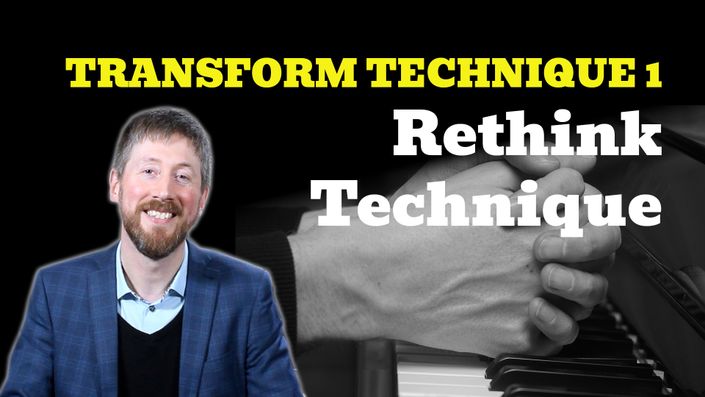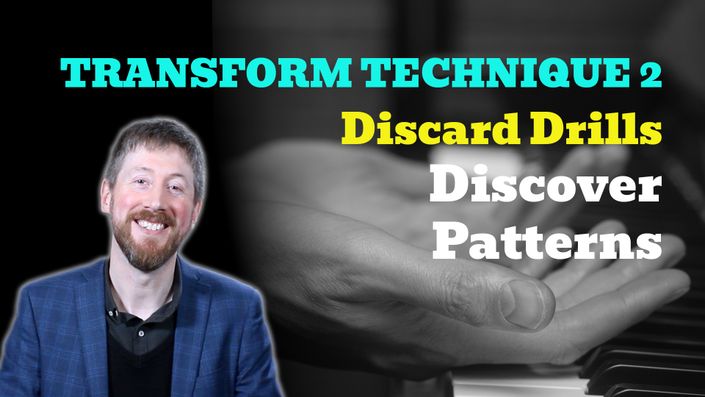
Play by Ear
for Pleasure and Technique
From the age of seven, I was a visual learner. Like many from my generation and earlier, and some students today, I learnt symbol before sound.
Until well into my professional career as a piano accompanist, teacher and occasional soloist, I felt stuck with the score. I used to dread birthdays as I couldn't even play Happy Birthday reliably on cue, by ear.
Fast forward to my mid-40s and I can reproduce simple popular songs by ear after one or two hearings, which feels like a dream come true. I can internalise complex songs, medleys and Intermediate-level classical pieces in a couple of sittings and perform them assuredly.
I've performed more complex music as a soloist confidently from memory for over a decade (see Course FAQ, below, for playing by ear vs memorising).
My playing coordination feels direct, flowing and relatively easy. If I can do it, anyone can!
This course is for:
- Adults with some playing experience seeking to play by ear from scratch
- Elementary-Intermediate adult players who feel stuck with the score
-
Piano teachers of all age groups
Course Contents
- Over 40 short, engaging videos (300 mins+) organised in 6 Levels
- Over 25 concrete Tools for playing melodies, bass lines and simple chords by ear in any genre
- Downloadable PDF Cheat Sheets, Summaries and Progress Charts
- Over 200 audio tracks of traditional songs arranged by toneset (pitch range) from 2 pitches to over an octave - doubles as an invaluable teaching resource
- Interactive Comments Sections for all videos
- Bonus Content: Play by Ear from the Score - using the Tools to take music 'off the page'
Please Note: the Piano Portals courses are not the kind that you 'complete' and discard. In the same way you don't 'complete' exercise or yoga, you'll find lifelong allies for fluent, expressive practice and performance to which you can return again and again.
Discussion Forum
Respectful, open-minded forum for technique accessible by enrollees in all Piano Portals courses.
Course FAQ
What do you actually mean by 'playing by ear'?
Hearing sounds in detail and being able to sing (or mentally sing) and, by extension, play them accurately, without resorting to trial and error.
Is that different from harmonising?
Subtly. Harmonising is adding bass lines/chords/accompaniments to melodies from scratch in your head without copying from a recording. Ideally, this would stem from lots of experience of playing by ear.
Some memorise theory (i. e. where particular chords 'ought' to go) which is arguably a less invigorating, expressive process than playing more spontaneously by ear.
This course focuses on hearing recorded sounds and reproducing them, which is an ideal precursor for harmonising out of your head.
Why is playing by ear helpful for memorising?
It's one of the Piano Portals Elephants in the Practice Room that confident memorisers 'hear' music clearly in their 'mind's ear', in the moment, as they play.
At music school, I left memorising largely to chance/'muscle' memory. I forgot pieces in a couple of high-profile performances and developed a block around memory lasting over a decade.
Pianists and pedagogues from Ronan O-Hora to Herbie Hancock have publicly highlighted the fundamental value of playing by ear.
You can imagine the tune to Twinkle, Twinkle, Little Star, right? But do you 'hear' it in enough detail in your mind to be able to play it confidently straight away on your instrument?
Perhaps you hear the second 'Twinkle' to be higher than the first. But exactly how much higher? Can you be sure you'll hit the correct pitch at the first attempt?
This course offers concrete Tools for hearing simple music in detail, in meaningful phrases and sections, in relation to a scale, and reproducing it confidently. These activities empower you to pay more and more attention to musical sounds and will 'rub off' on more complex contexts.
So, is playing by ear the same thing as playing from memory?
Not necessarily. Some claim memorising involves a range of focal points and perhaps for them it does.
Piano Portals proposes that playing primarily by ear - by hearing the music inwardly in detail - is a vastly more rewarding, reliable route to fluent, expressive memorising than playing primarily from theoretical cues, by rote or relying heavily on 'muscle' or 'motor' memory (procedural memory acquired through repetition alone).
Why is playing by ear helpful in technique?
Another Elephant in the Practice Room is that primarily visual learning can hinder technique.
If you learn from the score without also 'hearing' the music in detail in your mind's ear you could be selling yourself well short of your playing potential. You could be persisting with an unnecessarily stilted coordination and/or long-winded mental processing.
Musicians in many genres and cultures often learn to play by ear by default. They often attain high levels of technical facility in e. g. jazz improvisation or folk music.
Think of the technical difficulties or ceilings you face. Playing predominantly by ear produces direct, flowing playing coordination without hesitation or excess tension. Knowing the musical sounds assuredly can dissolve difficulties.
This doesn't have to mean abandoning the score. You can learn to internalise music in your mind's ear from the score. Experience in playing simpler music purely by ear can be enormously helpful in this respect.
Troubleshooting technique is the main focus of the Piano Portals Transform Technique courses. Learning to play primarily by ear is a central tenet of these. If, like me, you've been a primarily visual learner, you may benefit from giving this extra attention, either before or whilst delving into the physical detail of technique, hence this standalone, supplementary course.
Can't I just use aural tests and apps?
By all means, do! There are some great free apps, quizzes and resources that play melodies, intervals, chords, etc. for you to identify and even feed back on your progress. These are helpful for testing/measuring your aural skills, but how do you actually improve your aural processing so as to excel at these tests and at playing by ear?
Piano Portals offers concrete Tools for building your aural skills in musical, methodical ways. You can apply these in any context, from listening to songs and 'copying' them to memorising repertoire or acing aural tests.
I already play Intermediate - Advanced music from the score. Why should I to go back to simple melodies?
You can use the Tools with any music you choose. As an Advanced player, I still use these same Tools for memorising complex music.
In fact, difficulties in complex music can arise from simple oversights, such as failing to embody rhythms in relation to pulse and metre or hear pitches in relation to a scale.
My skills, technique and confidence have benefitted hugely from a regular, parallel practice involving simpler music.
When I discovered the joy and value of playing by ear, I internalised hundreds of 'tiny songs', then Elementary music and then complex music, in a relatively short time.
You can decide which Level of music to start with, assuming you assess honestly where you currently are with playing by ear.
Piano Portals recommends you do this as a parallel practice, alongside any other music you may be practising, playing or performing.
Every second you spend paying more attention to musical sounds will 'rub off' on more complex repertoire.
Is there a time limit to course access?
No. Once enrolled, you have unlimited access.
Can I revisit 'completed' Lessons?
Yes. Once enrolled, you have unrestricted access to all Lessons and resources.
Can I download Lesson videos?
Yes.
Example Curriculum
- Level 1 Tools Part 1 (24:12)
- Level 1 Tools Part 2 (13:41)
- Level 1-2 Music Part 1 - Black-Key Melodies 0001-0008 (m,s to m,s,l) (4:05)
- Level 1-2 Music Part 2 - Black-Key Melodies 0009-0015 (d,r,m) (3:19)
- Level 1-2 Music Part 3 - Black-Key Melodies 0016-0022 (d,r,m,s,) (3:39)
- Level 1-2 Music Part 4 - Black-Key Melodies 0023-0027 (d,r,m,s,l) (2:22)
- Level 1-2 Music Part 5 - Black-Key Melodies 0028-0035 (l,d,r,m to s,l,d,r,m) (4:16)
- Level 1-2 Music Part 6 - Black-Key Melodies 0036-0041 (s,l,d,r,m to s,d,r,m,s) (3:21)
- Level 1-2 Music Part 7 - Black-Key Melodies 0042-0047 (s,l,d,r,m,s) (3:24)
- Level 1-2 Music Part 8 - Black-Key Melodies 0048-0055 (d,r,m,s,l,d to s,l,d,r,m,s,l) (5:02)
- Level 2 Tools (21:01)
- Level 3 Tools (23:00)
- Level 3-4 Music Part 1 - White-Key Melodies (in C) 0056-0062 A (5:24)
- Level 3-4 Music Part 2 - White-Key Melodies (in C) 0063-0070 B-D (6:32)
- Level 3-4 Music Part 3 - White-Key Melodies (in C) 0071-0079 F-K (4:19)
- Level 3-4 Music Part 4 - White-Key Melodies (in C) 0080-0084 L-M (3:20)
- Level 3-4 Music Part 5 - White-Key Melodies (in C) 0085-0090 O-S (4:41)
- Level 3-4 Music Part 6 - White-Key Melodies (in C) 0091-0096 S-T (4:44)
- Level 4 Tools (7:03)
- Level 5 Tools (26:20)
- Level 5 Music Part 1 - DRONE 0097-0104 (4:07)
- Level 5 Music Part 2 - BASS 0105-0111 (3:09)
- Level 5 Music Part 3 - BASS 0112-0117 (2:51)
- Level 5 Music Part 4 - BASS 0118-0123 (2:56)
- Level 5 Music Part 5 - BASS 0124-0129 (3:01)
- Level 5 Music Part 6 - BASS 0130-0137 (5:18)
- Level 5 Music Part 7 - BASS 0138-0144 (4:47)
- Level 5 Music Part 8 - ROOT CHDS 0145-0152 (7:57)
- Level 5 Music Part 9 - ROOT CHDS 0153-0160 (9:32)
- Level 5 Music Part 10 - CHDS 0161-0166 (5:04)
- Level 5 Music Part 11 - CHDS 0167-0173 (3:49)
- Level 5 Music Part 12 - CHDS 0174-0179 (5:21)
- Level 5 Music Part 13 - CHDS 0180-0185 (5:39)
Meet Founder, Stephen Marquiss
MA (Cantab.)
Piano Portals Founder, Stephen Marquiss, journeyed from frustration to facility in playing in his 30s and 40s.
In the late 1990s, he left music school frustrated by recurring injury and a ceiling on technique.
Stephen spent 25 years refining a groundbreaking, holistic approach to piano technique that empowers Elementary to Advanced pianists to play to their potential.
Inspired by Abby Whiteside (1881-1956) and featured in International Piano and Music Teacher and on BBC Radio 3, Piano Portals is an accessible, joyful online school for technique and radical substitute for conventional exercises.
Stephen is an experienced pianist, tutor and speaker. He's been a piano tutor for the prestigious Jackdaws Music Education Trust since 2017 and three times an invited speaker at the UK Music and Drama Education Expo.
@pianoportals on YouTube for free tutorials
@stephenmarquisspiano on YouTube for playing videos




